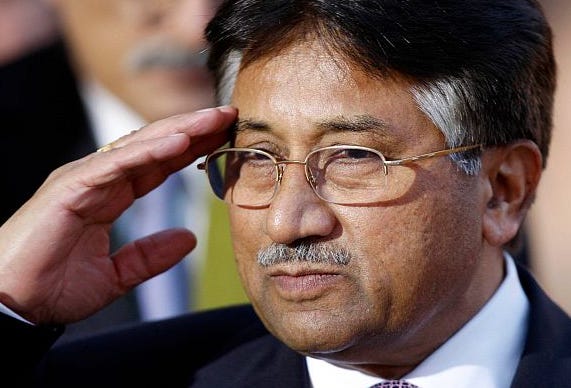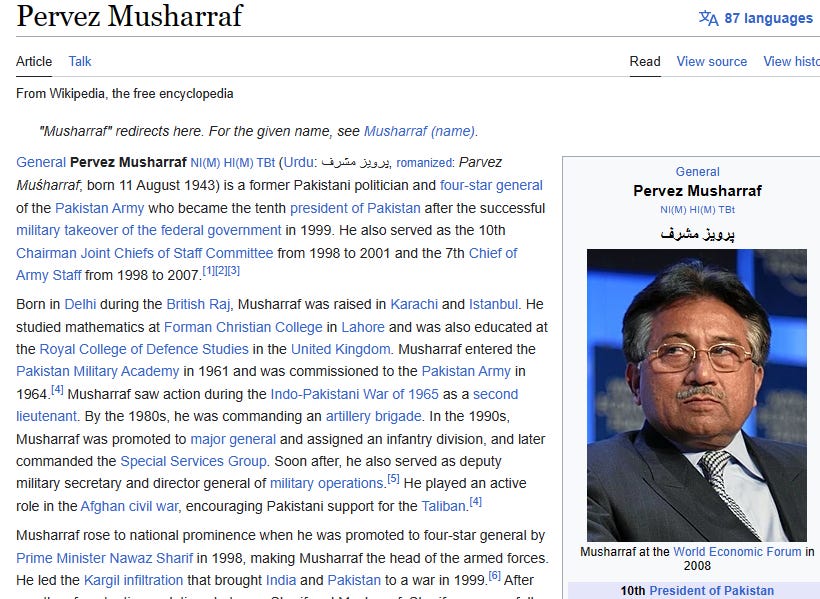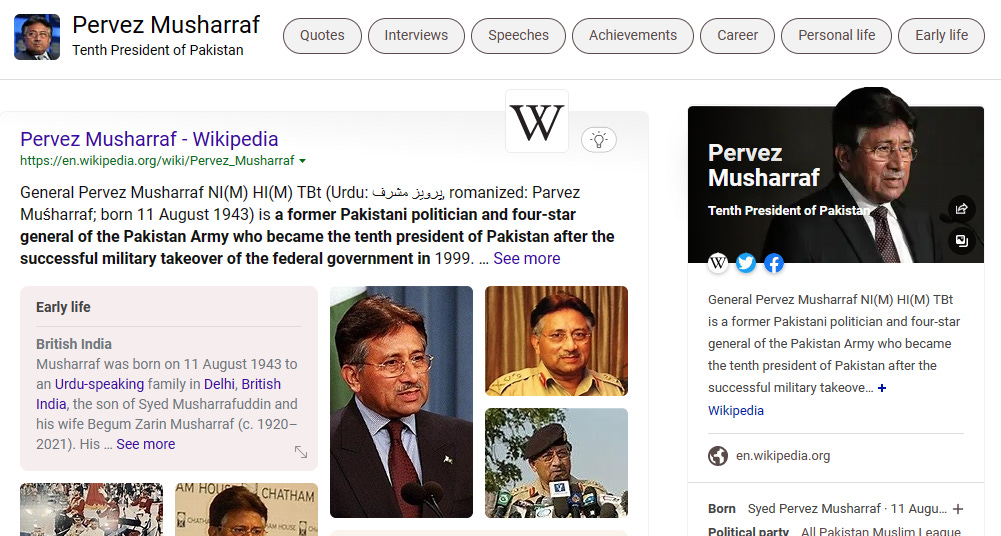Painful nonstop. Historic monsoon rains and flooding in Pakistan (nearly 40% Pakistani territory) last year have affected more than 30 million people. Loss in gross domestic product (GDP) as a direct impact of the floods is projected to be around 2.2 percent of FY22 GDP. The agriculture sector is projected to contract the most, at 0.9 percent of GDP. The damage and losses in agriculture will be gargantuan scale and painful in years.
Last week, officials have blamed a suicide bombing that killed 100 people inside a mosque or Masjid at a police and government compound in northwest Pakistan of Peshawar. And today (February 5th, 2023) Former Pakistani President (10th President of Pakistan) General Pervez Musharraf NI(M) HI(M) TBt (Urdu: پرویز مشرف, romanized: Parvez Muśharraf; born in New Delhi, 11 August 1943 – only him the former President Pakistan who has born in Delhi) has passed away. "Surely, we belong to Allah and verily to Him do we return." (Inna lillahi wa inna ilayhi raji'un (Arabic: إِنَّا ِلِلَّٰهِ وَإِنَّا إِلَيْهِ رَاجِعُونَ, ʾinnā li-llāhi wa-ʾinna ʾilayhi rājiʿūna)). Al Fatihah, pray for General.
It is said that political power in Pakistan flows from the three A’s: Allah, the Army, and support from America. Of the three, it is the army leadership that has the clearest means of ridding the country of Pakistan’s president in uniform, Pervez Musharraf. And that’s the main reason any power-sharing deal with former Prime Minister Benazir Bhutto is unlikely to end Pakistan’s political turmoil.
Musharraf hoped to extend his presidency this fall without caving in to opposition demands that he renounce his military position and restore a civilian rival to the post of prime minister. But few international leaders face such a wide range of sworn domestic enemies.
Since seizing power following a 1999 coup, Musharraf has survived at least three serious assassination attempts. His anti-terrorist partnership with the United States fatally undermined his political alliance with Pakistan’s religious conservatives even before his government stormed Islamabad’s Red Mosque in July, killing more than 100 people. The threat of terrorist attacks inside the country will continue to rise. Until Pervez passed away today.
Recent threats by the Bush administration to cut off billions of dollars in aid to Pakistan have sparked panic in government circles. Likewise, according to the Pakistani ambassador in Washington, military strikes by the United States aimed at al-Qaeda and Taliban havens inside Pakistan’s tribal areas would destabilize Pakistan and “possibly could bring [General Pervez Musharraf] down.” But how worried should the Pakistani authorities really be in the face of growing US pressure to root out Islamic militants?
General Musharraf is the third Pakistani general in fifty years to seize power proclaiming a self-anointed reform agenda. Each time the United States and its allies nodded in agreement. But Musharraf is no Gorbachev, nor is he Kamal Ataturk, who pushed internal reform on their societies after recognizing the rot within.
All of Musharraf's attempts at reform resulted from international pressure. Feeble at best, they have invariably avoided the type of structural changes Pakistan needs if it is ever to break out of its recurring, worsening crisis.
Occasional frustrations notwithstanding, it is, in fact, unlikely that the US will turn against a faithful – and dependent – ally, especially one whose leader enjoys cordial personal relations with Bush. Nor, due to a lack of organized opposition, will public anger at Musharraf’s pro-US policy destabilize his regime. Indeed, the wily general-president does not merely survive crisis after crisis, but has thrived in power.
Most revelations about Pakistan's nuclear scandal focus on the clandestine supply of uranium enrichment technology to Iran, North Korea, and Libya by the celebrated bomb-maker Dr. A. Q. Khan. (Even though Dr. Khan earned his Ph.D in metallurgy, not nuclear physics or nuclear engineering, yet journalists press reports usually refer to him as a "nuclear scientist"). But the documents that Libya turned over to the International Atomic Energy Agency, and subsequently to the US, show that Pakistan supplied more than just equipment for making bomb fuel. Dr. Khan allegedly also supplied a detailed nuclear weapon design that US experts say is of a 1964 Chinese vintage passed on to Pakistan two decades ago.
This disclosure raises interesting new questions because Dr Khan was peripheral to actual weapons-related work. Pakistan's nuclear establishment has essentially two divisions. One, once headed by Dr. Khan, is responsible for producing bomb-grade uranium gas that, when converted to metal, provides the crucial fuel for a nuclear explosion. The other division, which falls under the Pakistan Atomic Energy Commission and the National Development Complex, has a much wider range of responsibilities - conversion of uranium gas to metal, weapons design and manufacture, and nuclear testing.
Dr. Khan was barely mentioned by the head of the NDC, Dr. Samar Mubarakmand, in his victory speeches after the successful May 1998 nuclear tests. Thus the mystery: how could Dr. Khan - who had no need to possess weapons design information - have handed over detailed bomb design documents to Libya? Pervez maintained very perfect how to use nuclear weapons for deterrence between gigantic powers around Pakistan (India; Taliban, U.S., Russia).
Musharraf says he mulled the use of nuclear weapons against India amid tensions following the 2001 terror attack on the Indian Parliament, but decided against doing so out of fear of retaliation, according to a media report.
Musharraf also recalled that he had many sleepless nights, asking himself whether he would or could deploy nuclear weapons.
After his ill-advised dismissal of the chief justice of Pakistan’s Supreme Court ignited a firestorm of violent protests, Pervez Musharraf may be banking on Islamic fanatics to create chaos in the nation’s capital, Islamabad. Many suspect that an engineered bloodbath that leads to army intervention, and the declaration of a national emergency, could serve as a pretext to postpone the October 2007 elections. This could make way for Musharraf’s dictatorial rule to continue into its eighth year – and perhaps well beyond.
This perverse strategy sounds almost unbelievable. Musharraf, who (former) President George W. Bush describes as his “buddy” and supports an “enlightened moderate” version of Islam, wears religious extremists’ two close attempts on his life as a badge of honor. But his secret reliance upon the Taliban card – one that he has been accused of playing for years – increases as his authority weakens.
Signs of government-engineered chaos abound. In the heart of Islamabad, vigilante groups from a government-funded mosque, the Lal Masjid, roam the streets and bazaars imposing Islamic morality and terrorizing citizens in full view of the police. Openly sympathetic to the Taliban and tribal militants fighting the Pakistan army, the two cleric brothers who head Lal Masjid, Maulana Abdul Aziz and Maulana Abdur Rashid Ghazi, have attracted a core of banned militant organizations around them. These include the Jaish-e-Muhammad, considered to be the pioneer of suicide bombings in the region.
Pervez Musharraf stands virtually alone today while facing the most serious challenge to his presidency: possible impeachment by the new democratically-elected government.
The potential charges are serious: conspiring to destabilize the government that was elected last February, unlawfully removing the country’s top judges in November 2007, and failing to provide adequate security to Benazir Bhutto before her assassination last December 2006. Allying himself with the Bush administration has increased his unpopularity, especially following missile attacks by the United States in Pakistan’s tribal areas.
Despite earlier differences on how to deal with Musharraf, Pakistan’s leading political parties are now united against him. Feuding between the Pakistan People’s Party, led by Benazir’s widower, Asif Ali Zardari, and the Pakistan Muslim League (N), led by former Prime Minister Nawaz Sharif, had given Musharraf in years ago a chance to regain some standing after his allies were defeated in the elections. American reluctance to abandon Musharraf – together with prolonged electricity shortages, which made the new government appear incompetent – also raised his hopes.
Musharraf may be counting on the army, his primary constituency, to bail him out of this crisis. Though such support remains a possibility, it is unlikely that the army leadership will extend itself on his behalf.
Though a protégé of Musharraf, the army’s chief of staff, General Ashfaq Kayani, is a professional soldier for whom the army’s institutional interests are more important than the political interests of his former army boss. Kayani has repeatedly declared that the army will not interfere in political affairs, and that the parliament and constitution are supreme.
Even if the army is tempted to step in on Musharraf’s behalf, it has been chastened by political developments during the past year. The entire legal community arose to demand restoration of the country’s judges and reinforcement of the rule of law. The public’s demand for free elections and the resulting creation of a democratic government have forced the military to accept the public will.
The army has also paid a heavy price for Musharraf’s approach to the war on terror. Suicide bombers have struck repeatedly at military installations and personnel around the army’s headquarters in Rawalpindi. An increase in deadly attacks on army convoys in the Pakistan-Afghanistan tribal areas has also pushed the army away from Musharraf.
Though the army has reaped a financial windfall from US military aid, and has targeted many foreign militants allied with al-Qaeda in the region, its performance against Pakistani militants has been mixed at best. Consequently, the prestige of the Taliban and other militant groups operating in the area has grown. In this context, the army, seeking to avoid sole responsibility for reverses, wants a popular government to take charge of policy. No such government can emerge if the elected parties are unseated.
Nevertheless, there are signs of disagreement on important matters between the government and the army. The military recently blocked a government move to place Pakistan’s infamous intelligence service, the ISI, under the control of the interior minister rather than the prime minister. Musharraf backed the military’s opposition to this reform, gaining some gratitude from military commanders.
During (former) Prime Minister Yousaf Raza Gilani’s recent visit to the (former) President Bush repeatedly said that his administration supports Pakistan’s democracy, a policy since reiterated by Secretary of State Condoleezza Rice. This indicates that the US will not back Musharraf in any confrontation between him and Pakistan’s democratic forces. Most Pakistanis hope so.
Musharraf must assess what will be his legacy. Rather than trying to face down impeachment and prolonging the crisis, he should recognize that Pakistan cannot afford more instability, and that giving up honorably will bring him some respect.
For the sake of argument, even if Musharraf faces impeachment and by some stroke of luck is saved from being thrown out of office, his future will be bleak. In March 2009, the current ruling coalition will gain more seats in the Senate, and the government would almost certainly try to impeach him again.
Moreover, any attempt by Musharraf to dislodge the government by using his constitutional authority would trigger another election, the results of which would not be much different from the vote in February. It is time for Musharraf’s friends in the West to press him to serve his country one last time, by avoiding confrontation with his country’s democratic forces and calling it quits.
Rest in Peace, General. "Surely, we belong to Allah and verily to Him do we return." (Inna lillahi wa inna ilayhi raji'un (Arabic: إِنَّا ِلِلَّٰهِ وَإِنَّا إِلَيْهِ رَاجِعُونَ, ʾinnā li-llāhi wa-ʾinna ʾilayhi rājiʿūna)). Al Fatihah.






